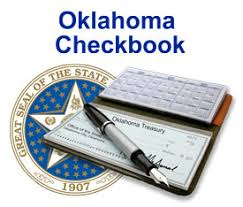Delayed Tax Filing Deadline Boosts Gross Receipts
Mike Seals - August 5, 2020 10:13 am

OKLAHOMA CITY – Gross Receipts to the Treasury jumped by more than 25 percent in July due primarily to the delayed income tax filing deadline, State Treasurer Randy McDaniel announced on Wednesday.
July receipts from all sources total $1.43 billion and exceed collections from July 2019 by $306.1 million, or 27.2 percent. It marks only the second time in six months that total receipts have topped those of the prior year.
“While July collections were strong, a different picture emerges when taking into account the delay of income tax filing,” said Treasurer McDaniel. “The details show the positive bottom line is concealing some less than favorable developments.”
With the income tax filing deadline moved to July 15, gross income tax collections were up by $360.5 million, or 106.3 percent, from the prior July. However, the increase failed to entirely offset the reduction of $414.4 million in income tax collections from April by $53.8 million.
July collections from the gross production tax on oil and gas extraction, totaled $22.9 million, down by $57.8 million, or 71.6 percent, compared to the same month of last year. The latest employment data show the state has shed 16,100 oil field jobs in the past year as prices and demand have fallen.
Sales tax receipts rose by a modest 1 percent in July, generating $421.5 million and reflecting an increase of $4.1 million from July of last year. Motor vehicle collections contracted slightly in July, down by just less than 1 percent over the year.
Since the start of the national recession, cumulative Gross Receipts to the Treasury are down by $411.8 million, or 5.9 percent, compared to the same six months of 2019. Twelve-month collections, an indicator of economic performance over a one-year period, are down by 2.8 percent with all major revenue streams except corporate income tax and use tax showing a pullback.
Economic indicators
The unemployment rate in Oklahoma was reported as 6.6 percent in June, down from 12.6 percent in May and 14.7 percent in April. The seasonally adjusted number of Oklahomans listed as jobless was listed at 116,602, according to figures released by the Oklahoma Employment Security Commission. The U.S. unemployment rate was listed at 11.1 percent in June.
The Oklahoma Business Conditions Index in July remained above growth neutral for a second month, following three months of numbers indicating economic contraction. The July index was set at 69, up from 53.1 in June. Numbers above 50 indicate economic expansion is expected during the next three to six months.
July collections
July gross collections total $1.43 billion, up by $306.1 million, or 27.2 percent, from July 2019.
Gross income tax collections, a combination of individual and corporate income taxes, generated $699.5 million, an increase of $360.5 million, or 106.3 percent, from the previous July.
Individual income tax collections for the month are $551.1 million, up by $230.5 million, or 71.9 percent, from the prior July. Corporate collections are $148.4 million, an increase of $130 million, or 706.7 percent.
Combined sales and use tax collections, including remittances on behalf of cities and counties, total $487.5 million in July. That is $12 million, or 2.5 percent, more than July 2019.
July sales tax collections total $421.5 million, an increase of $4.1 million, or 1 percent from the same month of the prior year. Use tax receipts, collected on out-of-state purchases including online sales, generated $65.9 million, an increase of $7.9 million, or 13.6 percent, over the year.
Gross production taxes on oil and natural gas total $22.9 million in July, a decrease of $57.8 million, or 71.6 percent, from last July. Compared to June 2020 reports, gross production collections are up by $3.3 million, or 16.8 percent.
Motor vehicle taxes produced $75.3 million, down by $658,083, or 0.9 percent, from the same month of 2019.
Other collections composed of some 60 different sources including taxes on fuel, tobacco, medical marijuana, and alcoholic beverages, produced $145.8 million during the month. That is $7.9 million, or 5.2 percent, less than last July.
Twelve-month collections
Gross revenue totals $13.32 billion during the past 12 months, August 2019 through July 2020. That is $376.8 million, or 2.8 percent, below collections from the previous 12-month period.
Gross income taxes generated $4.73 billion for the period, reflecting an increase of $95.4 million, or 2.1 percent, from the prior 12 months.
Individual income tax collections total $4.09 billion, down by $27.2 million, or 0.7 percent, from the prior period. Corporate collections are $641 million for the period, an increase of $122.6 million, or 23.6 percent, over the previous 12 months.
Combined sales and use taxes for the 12 months generated $5.48 billion, a drop of $100.8 million, or 1.8 percent, from the prior period.
Gross sales tax receipts total $4.73 billion, down by $151.6 million, or 3.1 percent, during the period. Use tax collections generated $750.7 million, an increase of $50.9 million, or 7.3 percent, over the previous 12 months.
Oil and gas gross production tax collections generated $771.4 million during the 12 months, down by $393.7 million, or 33.8 percent, from the previous 12 months.
Motor vehicle collections total $783.6 million for the 12 months. This is a decrease of $3.7 million, or 0.5 percent, from the trailing period.
Other sources generated $1.54 billion, up by $26.1 million, or 1.7 percent, from the previous period.
About Gross Receipts to the Treasury
The monthly Gross Receipts to the Treasury report, developed by the state treasurer’s office, provides a timely and broad view of the state’s economy.
It is released in conjunction with the General Revenue Fund report from the Office of Management and Enterprise Services, which provides information to state agencies for budgetary planning purposes.
The General Revenue Fund, the state’s main operating account, receives less than half of the state’s gross receipts with the remainder paid in rebates and refunds, remitted to cities and counties, and apportioned to other state funds.



